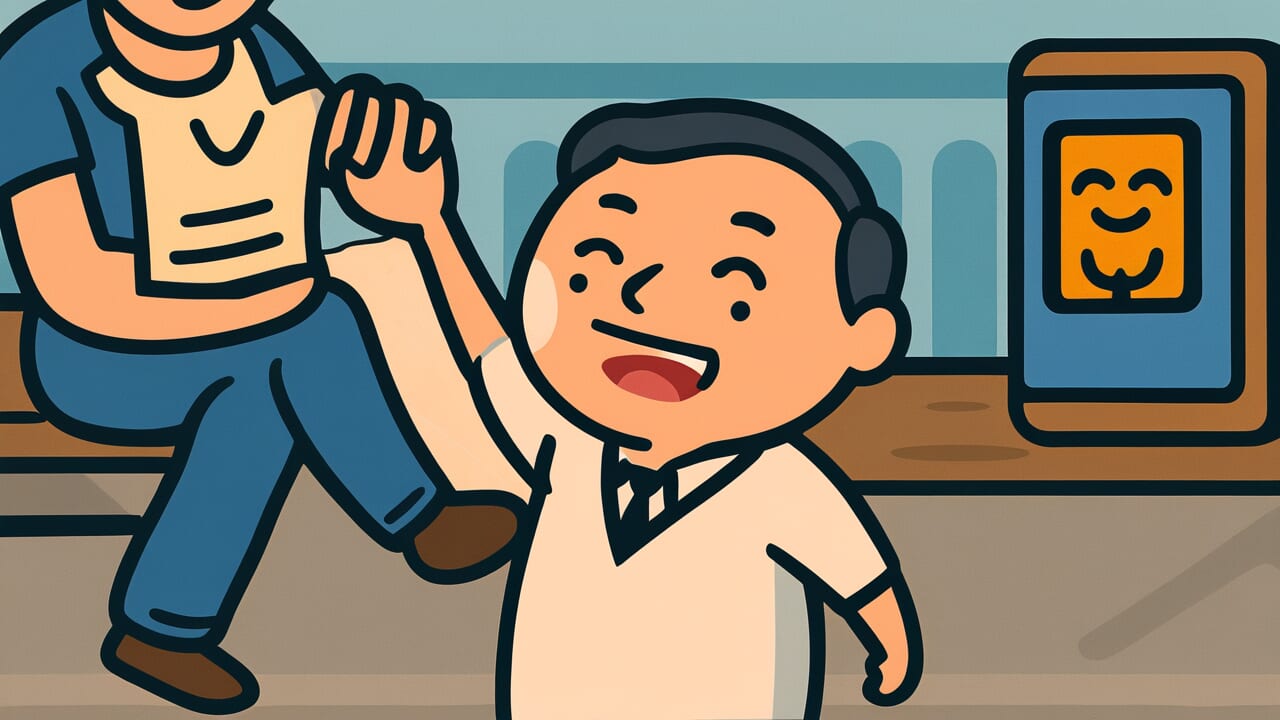How to Read “脛者の苦笑い”
Sunemono no nigawarai
Meaning of “脛者の苦笑い”
“脛者の苦笑い” is a saying about how there’s always someone more eccentric than you. It describes the complex feeling when someone who thought they were quite unique meets someone even more unusual.
This proverb is used when a person confident in their own uniqueness encounters someone who surpasses them. The word “bitter smile” captures that indescribable expression mixing surprise, admiration, and a touch of defeat.
Today, people use this saying when competing over individuality or uniqueness. It expresses humility, like “I thought I was pretty unusual, but I can’t match that person.”
It also captures the feeling of realizing just how vast and diverse the world really is.
Origin and Etymology
Clear written records about “脛者の苦笑い” are limited. However, we can make interesting observations from how the words are constructed.
The word “sunemono” literally means “a person with distinctive shins.” But here it’s used metaphorically. The shin is part of the leg usually hidden by clothing.
From this, “sunemono” came to mean someone with hidden peculiarities. In other words, an eccentric person who doesn’t stand out at first glance.
“Nigawarai” means a smile mixed with confusion or bewilderment. It describes the complex expression someone makes when meeting an even more eccentric person than themselves.
This saying likely emerged from Japanese society’s awareness of human diversity. No matter how unique you think you are, there’s always someone more unique.
The discovery of this truth, mixed with surprise and a kind of kinship, was captured in the memorable phrase “脛者の苦笑い.”
Usage Examples
- I was shocked by his outrageous fashion, but then someone even more extreme appeared and I could only manage a 脛者の苦笑い
- I was talking about my unusual hobby when I met someone even more obsessed, and all I could do was give a 脛者の苦笑い
Universal Wisdom
The proverb “脛者の苦笑い” contains deep insights about human self-awareness and humility.
We all recognize our own individuality and uniqueness to some degree. The feeling that “I’m different from others” forms an important part of our identity.
But this proverb teaches us how limited that self-awareness really is.
The world is vast, and human diversity is richer than we imagine. Even when you think you’re “quite unusual,” there’s always someone who goes further.
When facing this reality, people show that “bitter smile.” It’s not just a feeling of defeat. It’s a mature response mixing surprise, admiration, and awe at the world’s vastness.
This proverb has endured because it captures the eternal tension between two human experiences. One is the feeling that “I’m special.” The other is the reality that “there’s always someone better.”
This very tension keeps us humble while maintaining our curiosity. It’s the driving force that helps us grow.
When AI Hears This
The bitter smile of someone with a weakness actually contains three layers of information. Layer one: “I have a weakness.” Layer two: “The other person knows it.”
Layer three: “The other person knows that I know they know.” This nested structure is what game theory calls common knowledge. It’s not just shared information, but a state where both parties recognize each other’s recognition.
What’s interesting is how this state creates a kind of equilibrium. The person with the weakness seems forced to submit. But actually, the threat of “exposure would be bad” balances with the cost of “exposing would create conflict.”
A stalemate forms. The bitter smile is a signal that maintains this delicate balance. It means “I acknowledge your advantage, but please don’t push further.” An implicit negotiation condensed into a momentary expression.
Even more noteworthy is when this bitter smile occurs. It only happens in the middle zone where the weakness is “not fully exposed, but definitely known.”
If fully exposed, it becomes an apology. If unknown, a normal smile suffices. This precise information asymmetry creates the unique response of a bitter smile.
It’s a prime example of how the gradual nature of information influences human facial expressions as output.
Lessons for Today
“脛者の苦笑い” teaches modern people the importance of humility and an open mind.
Through social media and the internet, we connect with people worldwide. We encounter far more diverse values and lifestyles than ever before.
What you thought was unique might be ordinary to someone else. People more unique than you keep appearing constantly.
In such moments, remember the spirit of this proverb. You don’t need to feel down knowing there’s always someone better. Instead, celebrate the world’s richness and breadth, and maintain an attitude of learning from it.
Your individuality isn’t determined by comparison with others. But knowing the world contains more diverse people than you imagined helps you develop a more flexible and tolerant perspective.
The “bitter smile” is the first step toward letting go of a rigid self-image and living more freely. There’s always someone better. That means possibilities are expanding.



Comments